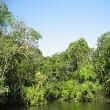Background
- Catuaba is a term used to describe teas made from the bark of types of Brazilian trees. These trees include Anemopaegma arvense, Anemopaegma mirandum, Erythroxylum vacciniifolium, and Trichilia catigua. Trichilia catigua is a small tree with clusters of yellow flowers.
- Catuaba has been used in Brazilian folk medicine as an aphrodisiac or an adaptogen (which protects the body from environmental factors). Catuaba may also improve the nervous system, heart and vein function, and memory. It may also increase energy and reduce anxiety or tiredness. Finally, catuaba may treat sexual dysfunction or cancer.
- The Brazilian herbal medicine Catuama®, a combination of extracts from a species of catuaba, guarana, muira puama, and ginger, has been used. However, at this time evidence that supports the use of catuaba for any condition is lacking.
References
- Barbosa NR, Fischmann L, Talib LL, et al. Inhibition of platelet phospholipase A2 activity by catuaba extract suggests antiinflammatory properties. Phytother Res 2004;18(11):942-944. View Abstract
- Batistini AP, Telles MP, Bertoni BW, et al. Genetic diversity of natural populations of Anemopaegma arvense (Bignoniaceae) in the Cerrado of Sao Paulo State, Brazil. Genet Mol Res 2009;8(1):52-63. View Abstract
- Campos MM, Fernandes ES, Ferreira J, et al. Antidepressant-like effects of Trichilia catigua (Catuaba) extract: evidence for dopaminergic-mediated mechanisms. Psychopharmacology (Berl) 2005;182(1):45-53. View Abstract
- Glasl S, Presser AM, Merner I, et al. Tropane alkaloids from a Brazilian bark traded as "catuaba". Scientia Pharmaceutica 2003;71(2):113-119.
- Kletter C, Glasl S, Presser A, et al. Morphological, chemical and functional analysis of catuaba preparations. Planta Med 2004;70(10):993-1000. View Abstract
- Manabe H, Sakagami H, Ishizone H, et al. Effects of catuaba extracts on microbial and HIV infection. In Vivo 1992;6(2):161-165. View Abstract
- Milot B. Testing of catuama: a Brazilian herbal energy product. HerbalGram 2005;Fall(68):22.
- Oliveira CH, Moraes ME, Moraes MO, et al. Clinical toxicology study of an herbal medicinal extract of Paullinia cupana, Trichilia catigua, Ptychopetalum olacoides and Zingiber officinale (Catuama) in healthy volunteers. Phytother Res 2005;19(1):54-57. View Abstract
- Pizzolatti MG, Venson AF, Smania A Jr, et al. Two epimeric flavalignans from Trichilia catigua (Meliaceae) with antimicrobial activity. Z Naturforsch C 2002;57(5-6):483-488. View Abstract
- Pontieri V, Neto AS, de Franca Camargo, AF, et al. The herbal drug Catuama reverts and prevents ventricular fibrillation in the isolated rabbit heart. J Electrocardiol 2007;40(6):534-538. View Abstract
- Tang W, Hioki H, Harada K, et al. Antioxidant phenylpropanoid-substituted epicatechins from Trichilia catigua. J Nat Prod 2007;70(12):2010-2013. View Abstract
- Tabanca N, Pawar RS, Ferreira D, et al. Flavan-3-ol-phenylpropanoid conjugates from Anemopaegma arvense and their antioxidant activities. Planta Med 2007;73(10):1107-1111. View Abstract
- Uchino T, Kawahara N, Sekita S, et al. Potent protecting effects of catuaba (Anemopaegma mirandum) extracts against hydroperoxide-induced cytotoxicity. Toxicol In Vitro 2004;18(3):255-263. View Abstract
- Zanolari B, Guilet D, Marston A, et al. Methylpyrrole tropane alkaloids from the bark of Erythroxylum vacciniifolium. J Nat Prod 2005;68(8):1153-1158. View Abstract
- Zanolari B, Guilet D, Marston A, et al. Tropane alkaloids from the bark of Erythroxylum vacciniifolium. J Nat Prod 2003;66(4):497-502. View Abstract







